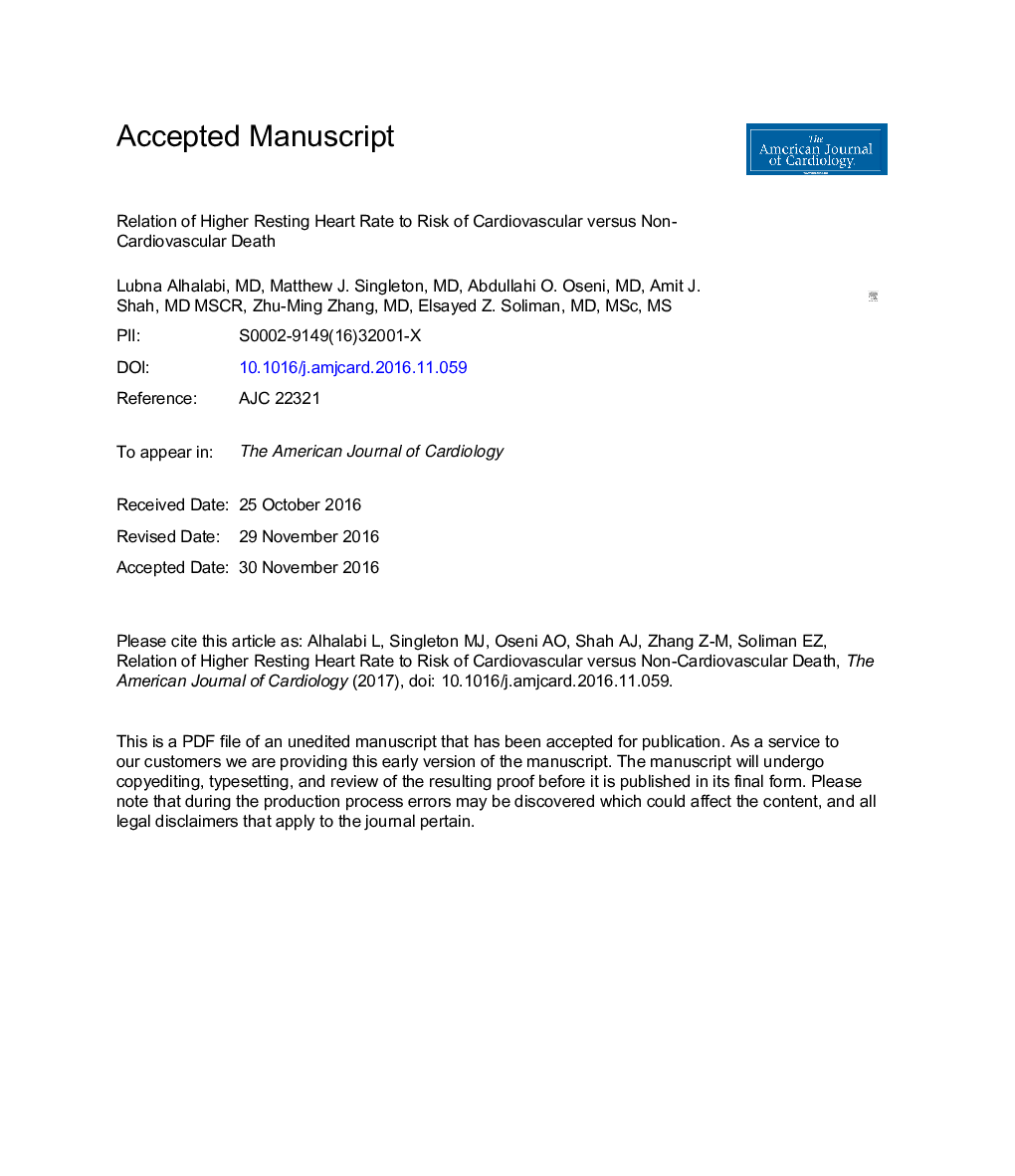| کد مقاله | کد نشریه | سال انتشار | مقاله انگلیسی | نسخه تمام متن |
|---|---|---|---|---|
| 5595147 | 1572091 | 2017 | 17 صفحه PDF | دانلود رایگان |
عنوان انگلیسی مقاله ISI
Relation of Higher Resting Heart Rate to Risk of Cardiovascular Versus Noncardiovascular Death
ترجمه فارسی عنوان
ارتباط میزان ترشح قلب بالاتر با خطر مرگ قلبی عروقی و غیر قلبی عروقی
دانلود مقاله + سفارش ترجمه
دانلود مقاله ISI انگلیسی
رایگان برای ایرانیان
موضوعات مرتبط
علوم پزشکی و سلامت
پزشکی و دندانپزشکی
کاردیولوژی و پزشکی قلب و عروق
چکیده انگلیسی
Higher resting heart rate (RHR) is associated with increased risk of all-cause and cardiovascular mortality, with some reports showing the magnitude of association with all-cause mortality being stronger than that with cardiovascular mortality. This suggests that RHR association with mortality may not be limited to cardiovascular death. We compared the association between RHR with cardiovascular and noncardiovascular mortality in 6,743 participants (mean age 58.7Â years, 52% women, 48% non-Hispanic whites) from the Third National Health and Nutrition Examination Survey (NHANES-III) after excluding those on antiarrhythmic drugs or with missing data. RHR data were obtained from standard 12-lead electrocardiogram recorded on the NHANES participants during a physical examination. National Death Index was used to identify the date and cause of death. Multivariable Cox proportional hazards analysis was used to calculate the hazard ratios (HRs) and 95% CIs for cardiovascular mortality and noncardiovascular mortality, separately, associated with 10 beats/min increase in RHR. During a median follow-up of 13.9Â years, 906 cardiovascular deaths and 1,306 noncardiovascular deaths occurred. In models adjusted for age, gender, race, hypertension, diabetes, obesity, dyslipidemia, previous cardiovascular disease, smoking, cancer, chronic obstructive airway disease, thyroid disease, and serum creatinine, higher RHR was associated with increased risk of both cardiovascular mortality and noncardiovascular mortality with a relatively similar magnitude of risk (HR 1.19, 95% CI 1.12 to 1.26 and HR 1.23, 95% CI 1.17 to 1.29, respectively). In conclusion, higher RHR is associated with both cardiovascular mortality and noncardiovascular mortality suggesting that RHR is probably a marker of overall well-being rather than a marker of cardiovascular health.
ناشر
Database: Elsevier - ScienceDirect (ساینس دایرکت)
Journal: The American Journal of Cardiology - Volume 119, Issue 7, 1 April 2017, Pages 1003-1007
Journal: The American Journal of Cardiology - Volume 119, Issue 7, 1 April 2017, Pages 1003-1007
نویسندگان
Lubna MD, Matthew J. MD, Abdullahi O. MD, Amit J. MD, MSCR, Zhu-Ming MD, Elsayed Z. MD, MSc, MS,
